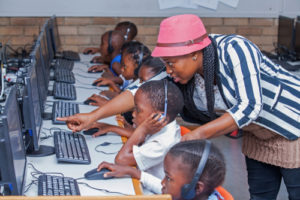Martin Plaut, Senior Research Fellow, Institute of Commonwealth Studies
A combination of fragile democracies, autocratic regimes and weak civil societies has put internet access and social media in Africa at serious risk. With an estimated 27.7% of Africa’s 1.2 billion people having access to the  internet in 2017 (compared to 54% in the rest of the world) the resource is increasingly important to its citizens.1 Yet their rights are frequently compromised or undermined, while regimes use social media to threaten democratic systems and rig elections. International companies, together with outside powers, have combined to exacerbate these trends. A handful of individuals and civic organisations are engaged in attempting to resist these threats to their liberties. Many of these are Commonwealth countries, although there are disturbing simularities and patterns of vulnerability across other African states.
internet in 2017 (compared to 54% in the rest of the world) the resource is increasingly important to its citizens.1 Yet their rights are frequently compromised or undermined, while regimes use social media to threaten democratic systems and rig elections. International companies, together with outside powers, have combined to exacerbate these trends. A handful of individuals and civic organisations are engaged in attempting to resist these threats to their liberties. Many of these are Commonwealth countries, although there are disturbing simularities and patterns of vulnerability across other African states.
Ethiopia used an Israeli commercial company, Cyberbit, to attack its opponents at home and abroad. This claim was made in a report by Citizens Lab, a Canadian based research centre focusing on internet security and rights. The 100-page report, published by Human Rights Watch, detailed the methods the Ethiopian government deployed.2 The authorities targeted mobile phone calls between friends and family members. “The Ethiopian government is using control of its telecom system as a tool to silence dissenting voices,” said Arvind Ganesan, business and human rights director at Human Rights Watch. “The foreign firms that are providing products and services that facilitate Ethiopia’s illegal surveillance are risking complicity in rights abuses.”
The Israeli company was by no means alone: the Chinese are reported to have provided most of the technology to monitor telecoms in Ethiopia via the Chinese telecommunications firm, ZTE. European companies are also implicated, as Human Rights Watch concluded:
“Several European companies have also provided advanced surveillance technology to Ethiopia, which have been used to target members of the diaspora. Ethiopia appears to have acquired and used United Kingdom and  Germany-based Gamma International’s FinFisher and Italy-based Hacking Team’s Remote Control System. These tools give security and intelligence agencies access to files, information, and activity on the infected target’s computer. They can log keystrokes and passwords and turn on a device’s webcam and microphone, effectively turning a computer into a listening device. Ethiopians living in the UK, United States, Norway, and Switzerland are among those known to have been infected with this software, and cases have been brought in the US and UK alleging illegal wiretapping.”
Germany-based Gamma International’s FinFisher and Italy-based Hacking Team’s Remote Control System. These tools give security and intelligence agencies access to files, information, and activity on the infected target’s computer. They can log keystrokes and passwords and turn on a device’s webcam and microphone, effectively turning a computer into a listening device. Ethiopians living in the UK, United States, Norway, and Switzerland are among those known to have been infected with this software, and cases have been brought in the US and UK alleging illegal wiretapping.”
China went further, tapping the computers of the African Union in the organisation’s headquarters, which the Chinese government had constructed.
It was only after Prime Minister Abiy Ahmed came to office in April 2018 that this trend began to be reversed. Controls on the internet were relaxed although how far the surveillance of phone calls has diminished is not clear.
So extensive is the control and surveillance of communications and social media across Africa that it is only possible to outline some of these threats.
* In South Africa the ruling African National Congress launched a covert campaign during the 2016 local elections designed to “disempower” the opposition. A “war room” was established to use social media, including Twitter and Facebook to achieve its ends.
* Cambridge Analytica – the company that worked for the Trump election campaign – is reported to have been employed to assist in the re-election of Kenyan President, Uhuru Kenyatta. The company is alleged to have engaged in extensive ‘data harvesting’ to reach its goals, running the Kenyatta campaigns in the 2013 and 2017 Kenyan elections.
is reported to have been employed to assist in the re-election of Kenyan President, Uhuru Kenyatta. The company is alleged to have engaged in extensive ‘data harvesting’ to reach its goals, running the Kenyatta campaigns in the 2013 and 2017 Kenyan elections.
* China, Russia and Iran are reported to have helped Zimbabwe establish a sophisticated surveillance system, known as the National Security Agency, monitoring landlines, mobile and all internet communications.
* Chad has established a sophisticated system to shut down social media and messaging systems including WhatsApp, Facebook Messenger, and Viber.
* In April 2018 Tanzania increased its control over bloggers by demanding a fee of $930 for each of them to register their sites. Uganda has followed the Tanzanian model, cracking down on opposition websites.
As Hilary Matfess and Jeffrey Smith concluded in an article for Foreign Policy: “Across sub-Saharan Africa, free expression is being unjustly curtailed, and the internet is increasingly being used by authorities to censor and surveil citizens, often with a focus on independent journalists, civic activists, and vocal opposition leaders who are seen as threats to the government. This sort of manipulation presents a clear threat to democratic values by constraining the internet’s potential to act as a virtual public square and by preventing the rise of a robust digital fourth estate.”
Among the most prominent civic organisations attempting to resist these trends is the Nigerian organisation, Paradigm Initiative. They have chosen the anniversary of the UN Declaration of Human Rights as a key benchmark for their work. “In light of the new reality that the battle for the defence of human rights has moved to cyberspace, on the 70th anniversary of the UDHR, Paradigm Initiative will work to ensure that the digital rights of people across Africa are protected.” The organisation’s annual report on digital rights in Africa is an excellent summary of the situation in 21 countries that they cover.
The Nigerians are not alone. In South Africa, for example, journalists working with amaBhungane (named after the dung beetle) performed a vital role in exposing the Gupta Brother’s role in what has been termed ‘state capture.’14
Access to the internet and freedom to use social media is increasingly important, particularly for young Africans. As the South Africa Institute of International Affairs concluded: “With Internet freedoms on the decline and more governments targeting social media and messaging apps to halt rapid flows of information, stifling dissent and increasing surveillance of citizens, research and advocacy on cyber policies become crucial.”

Recent Comments